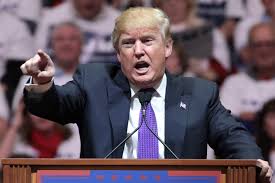Listening to the President issue his bellicose threat against North Korea made people around the world wonder: why now?
Early in their college careers students of rhetoric are introduced to the enduring idea that a leader’s public remarks are shaped by some kind of precipitating event. As the University of Wisconsin’s Lloyd Bitzer noted decades ago, public figures respond when they believe their words will answer a problem, bending it’s trajectory in ways the speaker imagines will be positive. In the short version of the idea, rhetoric is a response to an “exigency.” It doesn’t exist in a vacuum; it’s almost always a piece of a larger conversation provoked by a significant event. George W. Bush was slow to react to Hurricane Katrina, taking a lot of heat for the delay. He was better in assuring Americans after 9/11.
This simple notion that has not gone unchallenged, but it is also more than an empty academic term. It rewards us by asking that any comment be set in the context of immediate past events, not just as an isolated island of thought. When a president or public official speaks, we expect that there are clear reasons–significant antecedents–for steering our attention toward certain issues. The theory goes on to note that in significant ways the antecedents will govern the response. The glaring lateness of Donald Trump’s denunciation of white hate groups last Sunday is a violation of the principle. But his tone deafness on key events always been one of his problems. His comments are too little too late or too much too soon.
Of course Pyongyang is always making threats, but nothing coming from them seemed to warrant an out-of-the-blue threat to engage them and the world in a potentially catastrophic nuclear exchange.
Listening to the President issue his bellicose threat against North Korea on August 7 made people around the world wonder: why now? At the time he was in the midst of a meeting on the nation’s opioid crisis, and yet the warlike language on North Korea is how he unburdened himself when reporters were ushered into the room:
North Korea best not make any more threats to the United States. They will be met with fire and fury like the world has never seen. [Kim Jong-un] has been very threatening beyond a normal state and as I said they will be met with fire and fury and frankly power the likes of which this world has never seen before.
Apparently only after his comments did we learn that the North Koreans blustered that they were looking at options for attacking Guam, some 1800 miles away. Of course Pyongyang is always making threats, but nothing coming from them seemed to warrant the President’s out-of-the-blue challenge to engage them and the world in a potentially catastrophic nuclear exchange.
This was troubling because the sabre-rattling affair would make more sense if the exigency for his words was after North Korea’s threat. But no. Trump commented first on a Tuesday of last week. The North Korean’s comment came on Wednesday. In the short term, the larger exigency resided with the Koreans.
It is so like Donald Trump to make inaccurate and combative comments for reasons that only he understands. Too often his reference points are still the former president and Ms. Clinton. In his rhetorical wanderings he often seems like a befuddled fisherman casting a line miles from the closest stream. In this case he did have legitimate bragging rights after the unanimous United Nation’s vote to increase sanctions against the North. Any other President would have used the occasion to build off this diplomatic success. But on the sanctions he was mostly silent.
In this strange pattern there is a lesson in how much we are hardwired to place the flow of a person’s ideas in a larger frame of reference. Meaningful rhetoric is almost always a moment in a river of known events.
Exigency theory explains how we arrive at attributions of other people’s motives. We naturally search for the antecedents that seem to trigger strong reactions in individuals. There is a form to these things. We expect to be able to identify contributing factors for a significant presidential statement. This feeds into the dialogical form that is second nature to us. We mentally ‘build out’ from a person’s words to make conclusions about what likely gave rise to them. When we ask questions like “why did Mary say that?” we are looking for the triggering exigency. When we can’t find one, we worry that we are missing something important, or that the speaker has a chaotic mind that has drifted into magical thinking.

